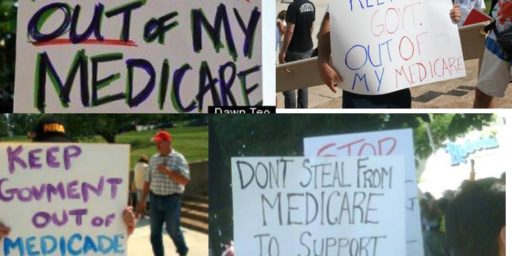Closing the “Donut Hole” in the Senior Prescription Drug Plan
One of the worst things President Bush did in terms of the fiscal outlook for this country was to put forward the Medicare prescription drug benefit. This plan is estimated to add $8.7 trillion in unfunded liabilities to Medicare’s $21 trillion in unfunded liabilities. This is money that we won’t be able to pay. And one of my big concerns is that the Democrats are going to want to close the “donut hole” in Medicare’s prescription drug program.
The “donut hole” is a range where seniors covered under Medicare Part D have to pay 100% of the costs of the drugs that they purchase. This range is between $2,250 and $5,100. When prescription drug purchases are below $2,250 the participant will have to pay a $250 deductible and 25% of the cost of the drugs, plus the cost of the plan, currently $420 annually. Once past the “donut hole” the cost of drugs are covered up to 95%.
My problem isn’t that there is a desire to help out seniors who are struggling to cover the cost of prescription drugs, but that in doing so it will add even more red ink to an already grim fiscal outlook. Closing the “donut hole” could add trillions more to the cost of Medicare.
Is there reason to think that the Democrats will want to do this now that they have majorities in both chambers of Congress? Yes.
“he Democratic Prescription for Change will make prescription drugs more affordable by allowing Medicare to negotiate lower prices and using those savings to close the donut hole; provide seniors with the simple and reliable option of a plan administered by Medicare; and ensure reliable and uninterrupted access to prescription drugs by stopping drug plans from increasing co-payments and creating burdensome bureaucracy.
Democrats intend to enact our Prescription for Change in a fiscally responsible way — improving the benefit without burdening future generations with endless debt.
The key here, for me, is the idea that by using the government’s “negotiating” power to get better prices for the drugs and use those savings to close the loophole without adding to the cost. Frankly, I think this is a load of wishful thinking.
For one thing, the prescription drug plan will likely induce employers to cut back and even eliminate drug coverage benefits to retirees. This will have the effect of raising costs for Medicare. Also, these programs just seem to have a way of becoming much, much more expensive than they are initially deemed to cost.
Further, the government doesn’t “negotiate,” it dictates things by fiat. The government says to the drug manufacturers: This is the price you will get. It will, in effect, be a type of price control for a very large segment of prescription drug consumers. This will greatly reduce or even eliminate the profits for pharmaceutical companies. So what can we expect will happen? Pharmaceutical companies will stop investing in R&D for new drugs that benefit the elderly. After all, if the rate of return falls for such investments, then other investments start to look (relatively) better. So one long term cost, that won’t show up on the accounting ledger, would be to have fewer drugs that would extend/improve the lives of the elderly.
The bottom line is that the Democrats’ claims that there is basically a “free lunch” here are just pure bunk. One thing that economics should teach everyone is that nothing is ever free. Everything has a cost, even if it is just the opportunity cost. In this case, the cost here is the profits for the pharmaceuticals industry. While some might see such an appropriation reasonable in that it is for the greater good, there are some very serious issues with unintended consequences and perverse incentives. Add on that Bush is a “compassionate conservative” who hasn’t met a government program he doesn’t love to spend money on, and my feeling is that the fiscal outlook for the country is only going to get worse.






Wow. I’ve said the same thing in comments here since you started blogging here and that is the first time I’ve every seen you acknowledge it.
TNSTAAFL, sure, but the hole could be closed or shrunk by spreading out the benefits more evenly.
Honestly, now — medical care without meds is a fake. Unless we’re just going to abolish Medicare (which we’re NOT, Steve … I see that look on your face!), then we’ve got to come up with something for prescription meds.
Let’s hope the parties work together to come up with something that makes a tiny bit of sense.
Oops, TANSTAAFL. My inner English major misled me.
Steve demonstrates once again that if he is not the stupidest person in the world he is by far the stupidest person who posts here, and that is saying a lot.
Employers did that long ago. There is no need to duplicate coverage which only drives up the overall cost of medical care without providing a dimes worth more value.
Cost will indeed go up as more people reach the age of eligibility. So what? Your alternative is what? Encourage early death instead?
Negotiations work pretty well with defense contracts. The government gets increasingly sophisticated innovative hardware and the defense contractors make a pretty decent profit. Only an idiot would think that negotiations cannot work equally as well for prescription drug contracts.
ken,
Yes, that $500 hammer was a heck of a negotiated price!
As for this,
So you acknowledge that this will drive up the costs. Costs that the GAO says we cannot pay as they are currently scheduled. So you alternative is to expand the program. What a sure fire way to get that early death you seem so worried about. Brilliant ken, simply brilliant.
Anderson,
Yep, TANSTAAFL.
If we accept that we have to have this plan, then allowing for some integration to include surgery, drug therapy, and other approaches to dealing with problems might also help contain costs. If the Democrats suggested something like that, it would be better, not great, but at least better, and a far cry better than the Republican’s best efforts to date.
Heh. Well, why not, there is Larry Kotlikoff’s plan. Despite ken’s assertions, I’m not some ogre that wants the old to simply crawl into a corner and die. If we are going to take this issue seriously, I think we should consider junking the current program and look for alternatives that will still keep the elderly from suffering. Right?
You missed another problem with the dictated price (and Ken the government doesn’t negotiate with providers for medicaid coverage, they dictate how much they will pay, why would it be any different for drug benefits?)-while it will likely put a damper on research and development, there is another area where the companies can make the difference and that is by passing on the cost to consumers by marketing the drugs at a higher price.
I think we should consider junking the current program
Daydreams for academics. Medicare is a wildly popular program. What pol wants AARP death squads at his door? The Sunnis got nothin’ on them, trust me.
Then unless a miracle happens like lots of baby boomers suddenly drop dead, amazing advances in science, or something else un-foreseen the budget picture is going to get very grim and it will start to have serious impacts on the economy as well.
Oh, and those seniors and the AARP will be screwed too as there simply wont be enough money.
Talk about staying the course right over a cliff.
Steve is right: something has to be done about Medicare. It’s a mathematical certainty. However what the “something” will be is far from a mathematical certainty and needs to be within the realms of the politically possible.
That covers a lot of territory including means testing, limitations on what’s covered, and major reform in the entire health care system.
I don’t happen to think that the results of Steve’s oft-repeated plea for a demand-side only reforms will have the results that Steve thinks they will. I think that both the demand and the supply sides of the equation need to be addressed.
Healthcare generally is one of the thorniest issues we have to address and the numbers indicate pretty clearly that if we do nothing (which seems all too likely) there will be very serious consequences and IMO that means we’ll be saddled with an even lousier system as an emergency measure.
I think we’re in for a bumpy ride. This morning there was an article in Salon arguing for a fully-socialized system.
Dave,
I focus on the demand side because that is where the problem largely lays. It is the subsidizing of demand via Medicare, Medicaid, etc. that is driving things here.
For example, I’m not at all convinced on the administrative cost argument. The government is probably the worst offender when it comes to bureaucratic excess and red tape…after all they are the primary producers of said red tape and bureaucratic excess. The thing is that private industry and the public sector measure administrative costs differently. So the comparisons are at best dubious. Basically, the argument is that government will produce less administrative waste even though they don’t have a profit motive, and private industry does.
From your post on emergency rooms,
But you seem okay with drawing conclusions about two different methods of allocting resources that use quite different objective functions (profits vs. I don’t know what for government run bureaucracies).
Part of the problem with things like emergency rooms could be the result of subsidizing health care and at the same time laws that make it mandantory to treat patients irrespective of ability to pay. That is ultimately a demand side problem and focusing on the supply side is treating the sypmptom and ignoring the cause. The supply side solution might work for a period of time, but the underlying problem is still there.
Some really little known facts about the donut hole: Premiums that
you pay for the coverage count towards the donut hole amount
(not just the amount you spend on drugs), and when you fall into the hole,
you still have to pay the premium even though you no longer get the coverage.
For some reason, this all strikes me as perverse.